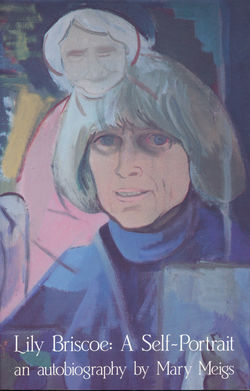Lily Briscoe

Реклама. ООО «ЛитРес», ИНН: 7719571260.
Оглавление
Mary Meigs. Lily Briscoe
Отрывок из книги
Lily Briscoe
A Self-Portrait
.....
The wife of a great man. Finally, she is less in his light than in his shadow. Great men—with nothing to prevent them from soaring as high as they can, all those qualities of greatness (the selfishness, the iron will, the discipline that sets hours and refuses to be disturbed) coddled and encouraged and excused by the women around them, for every great man needs his slaves, even if one of them, his wife, is a great woman. She, with the same qualities perhaps, running into the stone wall of Him. Or perhaps, she is an almost artist, like Caitlin Thomas, who, eclipsed, went half-crazy in the effort to salvage her soul. Edmund, who gave me John Stuart Mill to read, put me down in my enthusiasm (his put-downs were part of his male arsenal) for, whatever his respect for individual women, he knew from experience that women can’t be liberated. “They are the way they are, born that way, or they want to be that way,” he would say impatiently. I had to agree that many women are, one might say, typically feminine, and proud of it, that they are superficial, irrational, catty, that they are all the things they are accused of being. But that they are born that way? Rather, don’t they realize, very quickly, perhaps at birth, where their power lies, the perverted power that is allowed them? Anyway, that wasn’t the point. The point, which Edmund was incapable of getting, because no one had ever effectively challenged his power, was his right to command, to shout orders to his wife, his children, like a master sergeant in the Marines. (At an early age, I challenged this right in my older brother. “Why?” I asked him, when he told me to do something. “Because I say so,” he said, slapping me hard on the behind.) Where did this power come from, except from his own male assumption of it? Why was it that when he telephoned and said peremptorily, “Come over here around five, will you?” we trotted over like obedient dogs? To be sure, we grumbled; maybe we’d been in the middle of something, or ventured to give him some excuse for not coming. “Well, come if you can,” he would say angrily and he would hang up. We went, torn between our doggy devotion to Edmund and our ferocious sense of ourselves as beings who couldn’t, shouldn’t, be ordered around. And, as usual, we fell under the spell of Edmund, triumphant, doing his card tricks, playing Authors, anagrams, Chinese checkers, bouts rimés. We would tiptoe into the bright house and shout above the deafening music that poured from the depths of his study and he would appear, his face pink and freshly-shaved, to greet us.
Thinking about Edmund’s presence in my life, I make a distinction between the innocent prodigality of daytime and the nighttime Edmund who woke my anxieties. I described the daytime Edmund and his ancestral landscape in a letter to Anne Poor after our visit to him in July, 1964. “Upstate New York is . . . quite surprisingly like central Maine, with great elms, pastures, rolling hills and infinite green stretches under skies that generate thunderheads from nowhere, so there’s a marvellous play of light à la Greco’s ‘Toledo.’ One has more of a sense than in Maine of being on a frontier, even of something melancholy and sinister, but it’s probably because so many houses are actually falling down, and if they aren’t, they tend to be covered with hideous asbestos shingles or they consist of trailers that have been immobilized on cement blocks. There are very few really old houses and the towns are awful beyond words. Edmund’s house is BEAUTIFUL, very sparsely and simply furnished and freezing cold. I shivered so hard that he finally lit a fire in the dining room fireplace and we sat as close to it as we could. It was obvious that it was the first fire of the season, and that E. isn’t bothered by the cold. We spent almost all of the six days sightseeing—seeing natural wonders, ancestral mansions, Lake Ontario, Utica, Cooperstown. When there were a few minutes to spare, Bobbie [Barbara] and I would rush off to the underground river and the wonderful quarry, like Angkor Wat, but more ruined, or to some pasture where there were lovely cows (always Holsteins) and we’d run around to get warm . . . Then we’d sightsee and Edmund would talk more or less continuously about the past, and, in the evenings, he would play records or read to us or even sing songs of the twenties. In six days, we met only one set of neighbours, so you can imagine that our powers of attention were stretched to the breaking point and we’re still feeling rather limp.”
.....